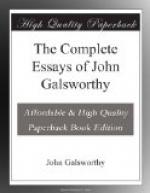If a set of Censors—for it would, as in the case of Literature, indubitably require more than one (perhaps one hundred and eighty, but, for reasons already given, there should be no difficulty whatever in procuring them) endowed with the swift powers conferred by freedom from the dull tedium of responsibility, and not remarkable for religious temperament, were appointed, to whom all sermons and public addresses on religious subjects must be submitted before delivery, and whose duty after perusal should be to excise all portions not conformable to their private ideas of what was at the moment suitable to the Public’s ears, we should be far on the road toward that proper preservation of the status quo so desirable if the faiths and ethical standards of the less exuberantly spiritual masses are to be maintained in their full bloom. As things now stand, the nation has absolutely nothing to safeguard it against religious progress.
We have seen, then, that Censorship is at least as necessary over Literature, Art, Science, and Religion as it is over our Drama. We have now to call attention to the crowning need—the want of a Censorship in Politics.
If Censorship be based on justice, if it be proved to serve the Public and to be successful in its lonely vigil over Drama, it should, and logically must be, extended to all parallel cases; it cannot, it dare not, stop short at—Politics. For, precisely in this supreme branch of the public life are we most menaced by the rule and license of the leading spirit. To appreciate this fact, we need only examine the Constitution of the House of Commons. Six hundred and seventy persons chosen from a population numbering four and forty millions, must necessarily,




